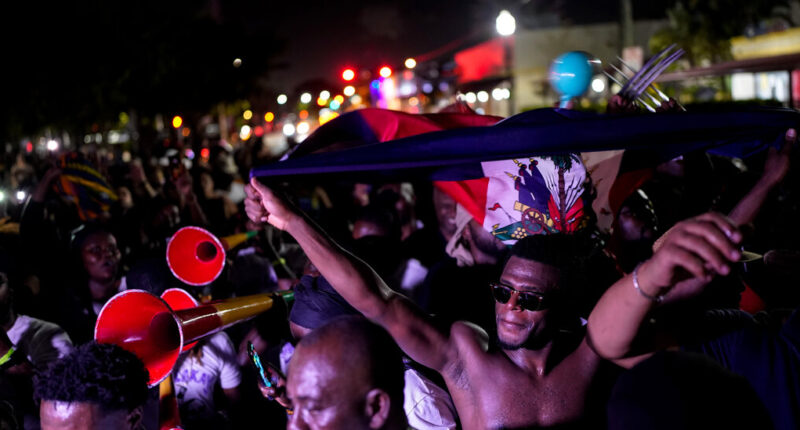
In July 1973, the Haitian activist Viter Juste moved his family and his belongings in a U-Haul truck from Bushwick, Brooklyn, to a neighborhood in Miami-Dade County known as one of the earliest settlements in the area.
Mr. Juste’s move — about a decade after he relocated to the United States — was the catalyst for a change in the neighborhood then known as Buena Vista. He convinced Haitians living in New York City to move to this area of Miami that is only minutes from the beaches and has glittering views of downtown. Thousands of others later migrated from Haiti and created a new community that Mr. Juste is credited for naming Little Haiti.
But now, displacement of the community is imminent. Little Haiti’s proximity to the hippest restaurants, bars, shops and clubs in Miami is enticing for developers. And as much of Miami-Dade County endures torrents brought on by climate change, the neighborhood’s elevation — about 10 feet above sea level and in an area of minimal flood hazards — is particularly attractive.
“This place is in deep trouble,” said Henry-Louis Taylor, Jr., a professor in the University at Buffalo, who researches redevelopment in cities. “There’s no way developers will allow it to stay in the hands of low-income population groups.”
Residents and activists in Little Haiti said they’ve seen the rise of gentrification for decades. It began in the late 1980s, when investors bought, and then ceased maintenance on properties with the intention of selling when the area became valuable to developers. Then, the Haitian American children and grandchildren of these founding community members went to college and never returned to the neighborhood. When their relatives died, they sold their homes. And for years, other homeowners have been inundated with phone calls, letters and visits from small investors trying to persuade them to sell. Then in 2019, a contentious, $1 billion redevelopment plan called the Magic City Innovation District was passed.
Nearly 100,000 Haitians lived in Miami-Dade County by 2000, where colorful murals memorialize neighborhood icons and seek to tell its story. Signs here are often written in Haitia Creole, and public buildings are adorned with framed paintings from local artists. But new retail spaces for content creators and high-end furniture are inching closer to Haitian bakeries, restaurants and shops. Businesses selling Haitian products, like Louis Market, are being kicked out. The neighborhood is only minutes away from some of the trendiest areas of the city like Wynwood or the Miami Design District, areas that were similarly displaced. Locals fear this is the beginning of the end for their cultural enclave.
“Now, you have 75 years of history gone by the push of two or three bulldozers in a matter of days,” said Carl-Philippe Juste, Mr. Juste’s son and a award winning photographer at the Miami Herald, during an interview in his art studio, which faces a mural of his parents.
The majority of residents in Little Haiti rent their homes, according to a housing market analysis prepared by Florida International University in 2015. Those tenants, many of whom have lived here for decades, have been greatly affected by the redevelopment of the area, and have been priced out to other areas like North Miami.
“Little Haiti is our home away from home,” said Jean Dondy Cidelca, 29, who moved to Miami from Haiti when he was 11 years old and is now renting in a shared home with other tenants. “It’s the closest I can be to my homeland.”
The neighborhood’s poverty rate is higher than average for the city of Miami, and the majority of residents here also fall well below the city’s median household income. Only about 26 percent of people living in Little Haiti own their homes, according to the analysis, and many of these homeowners are cost-burdened.
Property values have increased substantially since April 2012, when the average home in Little Haiti was valued at $58,403, according to data from the real estate website Zillow. In April this year, houses in this area averaged $482,557, according to Zillow.
Recent listings in the area are doubling down on the redevelopment opportunity. “Little Haiti is rapidly changing with the approved multi billion dollar project of Magic City Innovation District that is located right across this property,” one description said.
Construction of a 349-unit residential building will begin this fall, said Neil Fairman, the chairman of Plaza Equity Partners, one of the parties working on the Magic City Innovation District. An 18-acre site “in an underutilized warehouse district where there were no residents that would be displaced” was chosen, Mr. Fairman said in an email. Developers did not consider Little Haiti because of its elevation, but rather, because of its proximity to Wynwood, Midtown and an expansion of the Miami Design District.
“The development of an innovation district in your neighborhood means that the process of neighborhood replacement will intensify greatly,” said Mr. Taylor, Jr., the professor. “They will only destroy these neighborhoods.”
To soften the blow, the leaders of about 30 community organizations came together to negotiate with the partners of the innovation district directly for a benefits package beginning in 2016. But as they inched closer to a $100 million deal, the group split. The Magic City Innovation District committed to a $31 million deal done in payments for the Little Haiti Revitalization Trust.
“To put all these organizations together was the most difficult fight of my career here as an advocate,” said Miami-Dade County Commissioner Marleine Bastien, who was then a community activist and founder of the Family Action Network Movement, an organization that provides services for lower income and marginalized residents. “It was painful to see all these organizations leaving because they didn’t understand. They thought we could not win. We could’ve won.”
Mr. Fairman of Plaza Equity Partners said that they held more than 100 meetings with Little Haiti’s residents and community leaders. He added, “Other than a few professional activists there was very little opposition and most of the community’s residents have welcomed our $31 million commitment to the Little Haiti Revitalization Trust of which we have funded over $6 million to date.”
Using the money in the revitalization trust has been another challenge. In early 2021, Fayola Nicaisse, a businesswoman who frequented Little Haiti beginning as a teenager, began the process to join the board for the trust and worked her way up to become the chairwoman. She tried to allocate grants to help local businesses recover during the height of the coronavirus pandemic in October of the same year; she wanted to revise the deal with the Magic City Innovation District to get a lump sum to create affordable housing; and she wanted to submit a plan to revitalize the area very similarly to Little Havana, which now has abundant nightlife and new restaurants. And after a meeting where she criticized the developers of another nearly 26-acre project in the neighborhood, Sabal Palm Village, a city commissioner canceled her future meetings and asked her to reapply to the committee. Ms. Nicaisse parted ways with the board.
“I became very frustrated,” Ms. Nicaisse said, adding that there was a lot of resistance to distribute funds. “I was running a marathon through a slush of sand. I can see that they were pushing gentrification regardless.”
Developers have been helpful in supporting the children playing in the Little Haiti Football Club. The partners of the Magic City Innovation District have paid for their insurance, uniforms and some equipment.
“I hate to crush the narrative, but it’s the developers keeping the program alive,” said Pat Santangelo, a founder of the team. He added that many activists complained about these developers in meetings but “had no plan for the people in Little Haiti.”
Local leaders have sounded off alarms for years that residents were being pushed out, especially by small investors hoping to buy properties directly from homeowners, many of whom primarily speak French and Haitian Creole. Activists set up meetings where they told residents that no matter what these people told them, they were not obligated to sell.
These sessions happened after several people sold their homes under market value.
“Homeownership is your legacy, it’s what you leave to your children,” said Leonie Hermantin, the director of special projects for Sant La, a Haitian neighborhood center, which was forced to move out of its original space to North Miami after the landlord raised rent. “People who were dishwashers, lawn people, worked multiple jobs to buy their homes, they squandered what could’ve been a major financial legacy for their children.”
Every day, investors call Jan Mapou, the owner of a bookstore in the neighborhood with titles by Haitian authors. They’ve offered him millions for the property his store is on.
“I want to keep this for the community,” he said. This is my legacy. I even told my children: ‘If anything happens to me, do your best to conserve this.’”
Since 2019, Michel Bien-Aime has been overwhelmed by letters and phone calls from investors hoping to convince him to sell his three-bedroom home in Little Haiti. One note, he recalled, was intimidating because it said it was time for him to leave the property. Other mailers had photos of his house.
“Sometimes they make me nervous because they keep bugging us so much,” Mr. Bien-Aime, 70, who lives in the house with his extended family said. He said he bought the home in 1990, about 14 years after he left Haiti, for about $75,000.
Phone calls from investors only recently stopped when he sharply told someone: “Even if you have a billion dollars, I won’t sell.”
Dieu-Nalio, who is in exile from Haiti, received a grant from the McGraw Center for Business Journalism at the Craig Newmark Graduate School of Journalism at the City University of New York to produce the photography. Christina was born and raised in Miami-Dade County.
Source: | This article originally belongs to Nytimes.com









